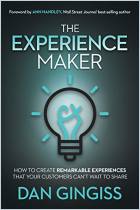Melden Sie sich bei getAbstract an, um die Zusammenfassung zu erhalten.

Melden Sie sich bei getAbstract an, um die Zusammenfassung zu erhalten.
Stefan Thomke
The Magic That Makes Customer Experiences Stick
The most memorable experiences are suffused with emotion – not extra features or value for money.
MIT Sloan Management Review, 2019
Was ist drin?
Customers’ emotions drive purchasing decisions and inspire engagement and loyalty.
Recommendation
Businesses are discovering the power of emotion to forge memorable customer experiences, inspire loyalty and influence purchasing decisions. Drawing from behavioral and quantitative research as well as marketing strategies from automaker Ferrari, watchmaker A. Lange & Söhne, and other high-performing companies, Harvard Business School professor Stefan Thomke delves into the psychology and power of emotional customer experiences in this insightful article for MIT Sloan Management Review.
Summary
About the Author
Stefan Thomke is the William Barclay Harding Professor of Business Administration at Harvard Business School.




















Comment on this summary